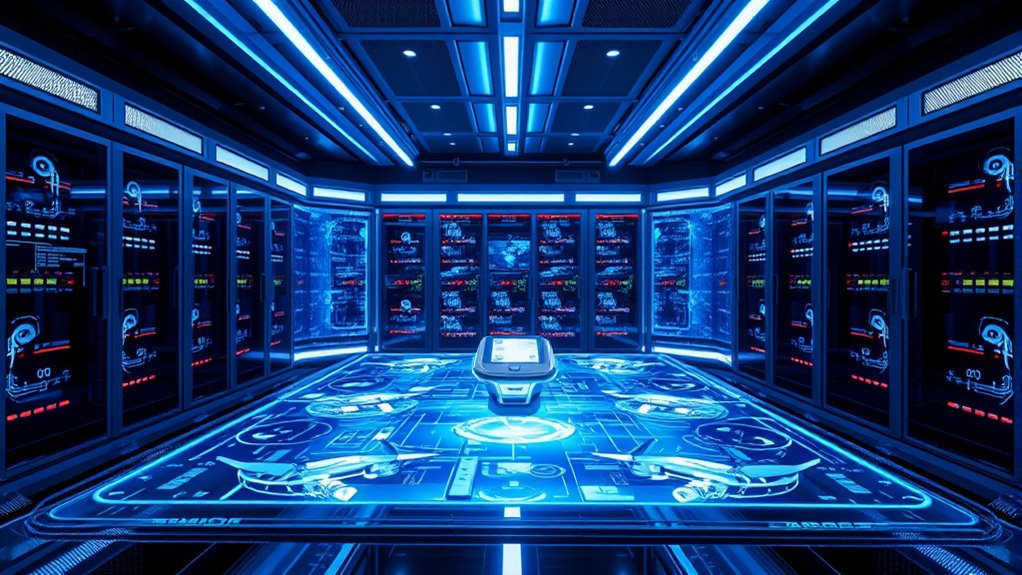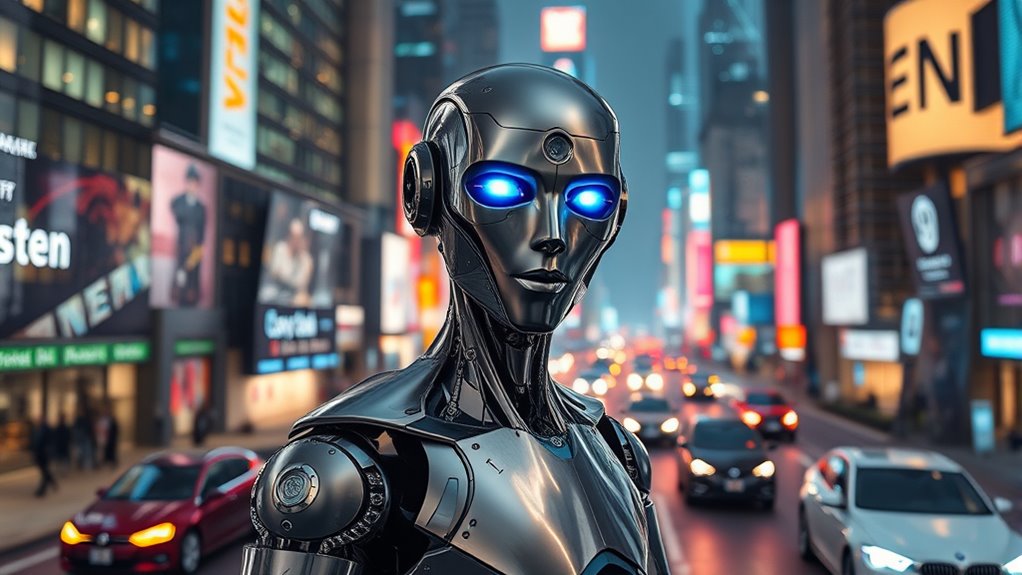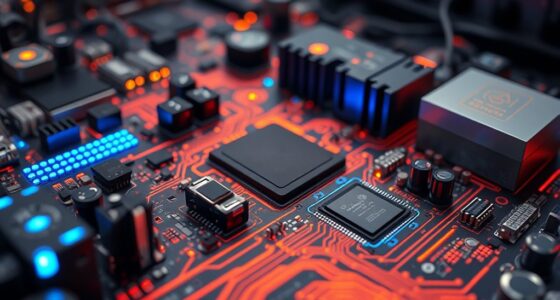The acceleration of agentic AI and autonomous systems is happening fast, transforming how we work and live. These technologies can make decisions independently and handle vast data quickly, offering significant benefits. However, they also raise ethical concerns, safety risks, and societal challenges like job displacement and misuse. As these systems become more advanced, it’s vital to take into account regulation, safety, and responsible development. Exploring these issues further will help you understand how to navigate this evolving landscape.
Key Takeaways
- Rapid technological progress enhances autonomous systems’ decision-making, learning, and adaptability capabilities.
- Increased deployment raises ethical challenges around accountability, biases, and unintended consequences.
- Strong safety protocols and oversight are essential to mitigate risks and ensure ethical AI behavior.
- Autonomous systems may disrupt job markets and influence public opinion, requiring proactive regulation.
- Responsible development emphasizes transparency, ethical guidelines, and collaboration to maximize benefits and minimize harm.

As artificial intelligence continues to evolve, agentic AI and autonomous systems are transforming how machines make decisions and perform tasks independently. These technological advancements enable machines to operate with minimal human oversight, opening new horizons for industries like healthcare, transportation, and manufacturing. However, as you explore these innovations, it’s essential to consider their ethical implications. The increasing autonomy of AI systems raises questions about accountability, transparency, and the potential for unintended consequences. When machines start making critical decisions—such as diagnosing patients or controlling vehicles—there’s a risk that biases embedded in algorithms or unforeseen errors could lead to harm. Consequently, understanding and addressing these ethical issues becomes crucial as technology advances.
As AI becomes more autonomous, ethical considerations like accountability and bias are more important than ever.
The rapid pace of technological advancements fuels the development of more sophisticated agentic AI, capable of learning, adapting, and even predicting outcomes. These systems can analyze vast amounts of data faster than humans, allowing for more efficient decision-making. But this power also presents challenges: how do you ensure these autonomous systems align with human values and societal norms? Developers are working to embed ethical guidelines directly into AI algorithms, but the complexity of human morality makes this task difficult. As you witness these systems becoming more autonomous, you should remain aware of the importance of rigorous testing, oversight, and regulation to prevent misuse or unintended side effects. Additionally, ongoing research into AI security highlights the need for robust safety measures to mitigate vulnerabilities and prevent exploitation.
Moreover, the acceleration of agentic AI compels you to think about the broader societal impact. Autonomous systems could displace jobs, influence public opinion, or even be weaponized if misused. These concerns demand proactive measures, balancing technological progress with responsible deployment. As you engage with this rapidly changing landscape, it’s vital to advocate for policies that promote transparency and accountability. Ensuring that autonomous systems operate ethically requires collaboration between technologists, policymakers, and ethicists—an ongoing effort driven by the pace of technological advancements.
In essence, the unfolding story of agentic AI and autonomous systems offers incredible potential but also demands careful ethical consideration. You’re part of a broader community that must navigate these innovations thoughtfully, ensuring that progress benefits society without compromising safety or moral standards. As systems become more capable of independent decision-making, your awareness and engagement will be key to shaping a future where technology serves humanity responsibly. The future of AI depends on how well you understand and address these ethical implications while embracing the ongoing technological advancements that continue to push the boundaries of possibility.
Frequently Asked Questions
How Might Agentic AI Impact Global Economic Inequality?
Agentic AI could widen wealth disparity and deepen economic stratification by automating high-paying jobs and favoring those who control the technology. You might see increased inequality as marginalized groups lack access to AI benefits, while the wealthy leverage AI for even greater gains. This shift could lead to a more divided society, making it harder for lower-income populations to compete economically and creating long-term social and economic challenges.
What Are Potential Legal Liabilities for Autonomous Systems’ Actions?
You might face legal liability if autonomous systems cause harm or damage, as current accountability frameworks may not fully cover these situations. It’s crucial to establish clear liability rules, defining who’s responsible—developers, operators, or manufacturers—when things go wrong. As AI advances, you’ll need updated legal guidelines to ensure accountability, prevent blame-shifting, and protect affected parties, all while adapting existing laws to address autonomous decision-making.
How Can We Ensure Ethical Decision-Making in Agentic AI?
You can guarantee ethical decision-making in agentic AI by integrating clear moral frameworks into its design and programming. Prioritize decision transparency, so you understand how and why the AI makes specific choices. Regularly audit the system for bias and ethical compliance, and involve diverse stakeholders to align the AI’s actions with societal values. These steps help build trust and ensure the AI acts responsibly and ethically.
What Safeguards Prevent Autonomous Systems From Malicious Use?
You can prevent malicious use of autonomous systems by implementing strong security protocols and adhering to ethical frameworks. These measures include robust access controls, continuous monitoring, and regular updates to patch vulnerabilities. Establishing clear guidelines for responsible use and accountability guarantees systems are aligned with ethical standards. By combining security protocols with ethical frameworks, you create a layered defense that minimizes risks and discourages malicious activities.
How Will AI Autonomy Influence Human Employment and Job Roles?
AI autonomy will reshape your job roles and employment landscape by automating routine tasks, prompting you to focus on complex, creative, or interpersonal skills. To stay relevant, you’ll need ongoing AI skill development and adaptability. Workforce adaptation becomes essential as employers offer training and support, ensuring you can leverage autonomous systems effectively. Embracing change will help you thrive in an evolving job market driven by autonomous AI advancements.
Conclusion
As you watch agentic AI and autonomous systems develop, it’s clear they’re transforming how we live and work. Did you know that by 2025, over 75% of new AI applications will incorporate some level of autonomy? This rapid acceleration means you’ll soon rely on these systems more than ever—making daily tasks easier but also raising important questions about control and trust. Embrace the change, but stay mindful of the power these intelligent agents hold.










